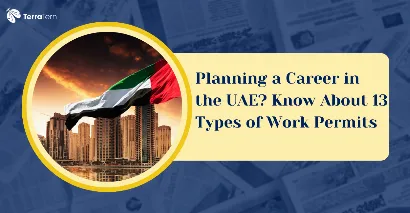Key Highlights
Navigating the complexities of international career planning requires understanding local regulations, and for those looking at the United Arab Emirates, this journey starts with understanding its work permit system. The UAE, a global business and innovation hub, has simplified its processes to attract a wide range of talent, from seasoned professionals to students and freelancers. This blog post breaks down the different types of work permits available to help you plan your professional future in the Emirates.
Also Read: UAE Visa Check: Fast, Secure, and Hassle-Free Status
UAE’s Evolving Work Permit Framework
The UAE’s Ministry of Human Resources and Emiratisation (MoHRE) has put in place a robust framework to regulate the labour market. This system ensures legal employment, protects employer and employee rights and supports the country’s economic goals. A recent development is the Work Bundle, a government initiative under the Zero Bureaucracy Programme. This digital platform has streamlined the hiring and visa process, consolidating many steps and documents into one workflow. This has reduced processing times and made it faster for companies to hire and for individuals to get their permits and residency.
The Foundation: General Work Permits
At the core of the system are the permits for regular employment. The Recruitment from Outside UAE permit is the standard visa for foreign workers hired from abroad, valid for 2 years. The transfer permit allows a worker to move from one UAE company to another and is also valid for 2 years. These are the most common permits for expats securing long-term positions.
Supporting a Diverse Workforce
The UAE’s approach goes beyond the traditional employer-employee relationship. The Family Sponsorship Permit is a key provision, allowing individuals who are already under family sponsorship (usually a spouse or parent) to work legally. This gives dependent family members the flexibility to contribute to the economy without needing separate company sponsorship. This permit is also valid for 2 years.
Specialised and Flexible Permits
Beyond the regular, the UAE has many specialised permits to cater to different career paths and working styles. This is a hallmark of the country’s modern labour policies.
Also Read: Job Seeker Visa UAE
Short-Term and Project-Based Work
For those on specific short-term tasks, the temporary work permit is the way to go. This permit allows a worker to be seconded to another company for a short period and provides a legal basis for short-term projects. A related but separate permit is the mission work permit for non-UAE workers on a project for the duration of the project.
Bridging the Gap: Part-Time and Freelance Opportunities
The modern global workforce demands flexibility, and the UAE has responded. The part-time work permit allows individuals to work for multiple employers or reduced hours, legalising what was previously informal. This is complemented by the freelance work permit, a game-changer for self-employed professionals. This permit frees individuals from the need for employer sponsorship, allowing them to offer their services independently. Its validity varies depending on the specific freelance activity and sector.
Catering to Specific Sectors and Demographics
The government has also created permits for highly specific situations, showing a granular approach to workforce management. The juvenile work permit is an example of this, allowing individuals aged 15-18 to work under safe, restricted conditions, promoting early career exposure. The student training and employment permit is for students aged 15 and above who are undertaking training or internships, with a three-month validity.
Permits for High-Value Individuals and Local Talent
The Golden Visa holder work permit is a big deal for Golden Visa holders. It allows them to join any UAE company; they are valued citizens. For local talent, the UAE/GCC national work permit and national trainee work permit are designed to integrate and train UAE and GCC nationals in the private sector, in line with nationalisation goals.
The private teacher work permit is another special category for qualified tutors. This permit, valid for 2 years and often free of charge, legalises private lessons, regulating the informal education sector.
Also Read: UAE Immigration: How to Move to the United Arab Emirates?
Conclusion: A Forward-Looking Approach to Global Talent
The UAE is not just a place to work; it’s a regulated ecosystem to attract and retain global talent. The country’s work permit system, with 13 types of permits, reflects a forward-thinking approach to cater to a wide range of professionals, from long-term employees to short-term project workers and freelancers.
The government’s efforts to streamline the process, most notably through the “Work Bundle” initiative, show they are committed to making the country a frictionless environment for business and career growth. By understanding and leveraging this system, aspiring professionals can plan their next career move and unlock the many opportunities the UAE has to offer. Visit TerraTern to know more.








